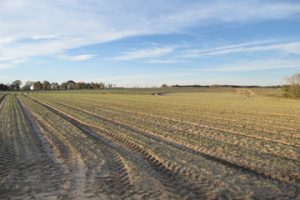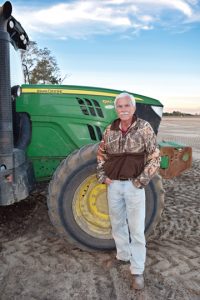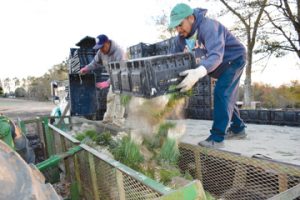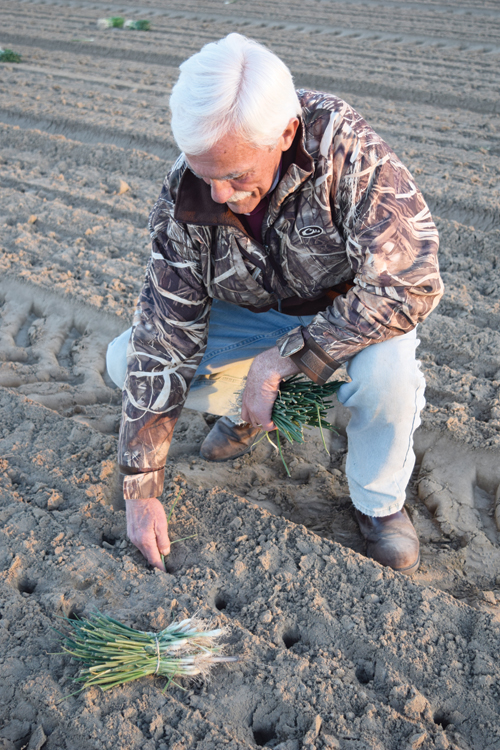Generation Farms
Story by Denise Keller, Editor
Photos by Dave Alexander, Publisher
As farm manager Danny Bowen says, the name Generation Farms speaks for itself.
“We’re trying to build a farming system that will be sustainable for generations to come, by holding true to the finer things of past generations and embracing new technology to sustain the farm for future generations,” he explains.
A new entity as of 2016, Generation Farms brings together two farming families, the Stanleys and the Coggins, and combines their many decades of experience and expertise. With production covering farmland across southern Georgia and northern Florida, Generation Farms grows a long list of crops including onions, carrots, watermelon, green beans, snap beans and sweet potatoes.
Onion production includes Vidalia onions and Grano varieties, as well as reds, some whites and also organic onions – mostly Vidalia onions, along with some reds.

Generation Farms’ onion production includes Vidalia onions and Grano varieties, as well as reds, some whites and also organic onions.
Growing Challenges
Vidalia onions are far from an easy crop to grow, Bowen says. And as with most crops, the majority of the potential pitfalls are related to weather. Ideally, the growers would prefer low temperatures to average in the upper 30s with highs averaging in the upper 50s to low 60s from December into February. Most winters, however, bring warmer, and often wet, weather conditions.
Warm, wet winters can promote too much growth in the onions early in the season, making the crop more susceptible to freeze injury if a hard freeze hits in January or February. These conditions also increase the risk of disease in the plants, particularly in early to late spring.
“The variability in the climate is the biggest challenge, but that same climate is what makes the type of onion we grow sweet and desirable. So it’s just something we have to deal with,” Bowen reasons.
The current growing season has been somewhat warm, especially in late December. But so far, the season’s most notable weather event was the 6 to 9 inches of rain delivered in a 24-hour period in early December. The storm caused some soil erosion and onion stand loss in the Vidalia region.
Disease pressure has been light so far, the farm manager says, acknowledging that Stemphylium leaf blight and Botrytis leaf blight have been challenging for the entire industry in recent years. With weather conditions that create an environment favorable to disease development of any kind, the farm utilizes an agronomy team and maintains an aggressive pesticide and fungicide program to prevent problems. Of course, options are limited in the farm’s organic onion production, but Generation Farms has extensive experience in organic farming, Bowen adds.
Vidalia onions are also a labor-intensive crop for Generation Farms. Onion transplants are planted by hand from early November through mid-December, although the farm is trialing a small acreage of direct-seeded onions. The farm harvests 90 percent of the onions by hand because Vidalia onions are prone to bruise and mechanical damage during harvest.
“Vidalia onions are tender by nature. That’s what makes them sweet is high water and sugar content,” Bowen explains. “That also makes them a little more perishable than a real hard onion grown in an arid climate.”

Danny Bowen oversees Generation Farms’ farming operations in the Vidalia, Georgia area, which include onions, watermelon, snap beans, cotton, peanuts, corn and soybeans.
Family of Farmers
The challenges of growing Vidalia onions are all familiar to the Stanley family. The Stanleys have been farming in the Vidalia area for six generations, starting with R.T. Stanley Jr.’s great-great-grandfather prior to the Civil War.
R.T. Stanley Jr. began farming as a sharecropper in 1964 before buying his first 127 acres of land four years later. In 1974, he and his dad, Rodney Stanley, together established Stanley Farms, with tobacco as the farm’s cash crop. But with the adverse health effects associated with tobacco, the Stanleys could see the need to produce something else. In 1975, they grew five acres of Vidalia onions and gradually increased acreage through the years.
In the late 1980s and 1990s, each of R.T.’s three sons graduated from the University of Georgia and chose to join the family farm. Brian traded in plans to become a Wall Street stockbroker to handle the farm’s sales. Tracy used his engineering degree to manage the farm’s equipment and packing houses. Vince, who studied forestry, orchestrated the purchase of a nearby processing plant and turned the operation into a key segment of the business. The facility processes onions for fresh-cut and processed products.
In 2013, an investment company approached R.T. about purchasing the farm. The sale was complete in 2016, and the farm was merged with Coggins Farms, which the investment company had purchased previously, to form Generation Farms.
“I’m looking back now thinking this is one of the best things I’ve ever done,” R.T. reflects, noting recent low prices, as well as increasingly burdensome government regulations. “I think my family made the right decision. Not only that, we’re staying here working on the farm.”
Brian and Tracy continue in their roles on the farm while Vince oversees the portion of Generation Farms in the Vidalia area. R.T. is serving as a consultant for the farm.
“I can’t beat that at my age. I’m 73, so I’m not physically able to do a whole lot of work. But I can sure ride around and tell them what I think, and I’m enjoying every minute of it,” R.T. smiles.

Generation Farms employees load a tractor with onion transplants to be distributed throughout the field for planting.

Danny Bowen checks the soil moisture conditions during planting in early December 2016.
Focus on Efficiency
The integrity and ingenuity that kept the Stanleys farming for six generations remains unchanged, Bowen says. Under the new ownership, Generation Farms is coupling those values with conservation and sustainability.
To better utilize the land, the growers have increased onion plant populations significantly in the last few years. This improves yield potential; however, the possible trade-off is a greater difficulty controlling diseases because too dense of a population can limit fungicide coverage, airflow and sunlight. Striking a balance between maximizing yield potential and minimizing disease risk is an ongoing process.
The growers are also refining fertilizer application methods to be more precise and improving irrigation systems to avoid over-watering.
Looking ahead, Generation Farms plans to expand onion production along the East Coast to increase its capacity as a year-round supplier of onions and other fresh vegetables and fruit.
Originally published in Onion World magazine, February 2017